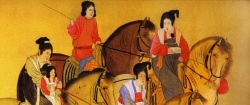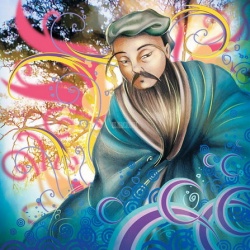I-Ching Use In Ancient Chinese Politics And Warfare
Chinese historiography and ancient literature is dotted with stories of individuals consulting the I-Ching including the consequences of the oracular answers to individual plans, strategic decisions, politcal intrigue and military campaigns. In the following 64 parts, translations of such stories and anecdotes -- for the most part still unknown outside of China -- will be made consecutively by the author for the benefit of interested readers and scholars. The parts are to be compiled one by one and grouped according to the sequence of the 64 hexagrams in the I-Ching.
Nr. 1. The Hexagram QIAN 乾
☰
☰
1.1. QIAN Symbolizes The Creative Action of Heaven 乾為天
The ancient Chinese text from the Tang Dynasty (618 CE - 907 CE) called "Record Of Determinist Tales" (Ch. Dingming Lu 定命录) relates to a historic anecdote involving the Hexagram QIAN and more specifically the stanza' "QIAN symbolizes the creative action of heaven" (Ch. Qian Wei Tian 乾為天)
The Dingming Lu reports that a renowned fortune teller named Shen Qi lived in a town called Yuezhou. On a certain day in the 14th year of the Tianbao-reign of emperor Tang Xuanzong (756 CE) he was visited by a certain Wang Zhu who was on his way to the imperial capital of Chang'an for an audience with the Son of Heaven: emperor Tang Xuanzong. It seems that Wang just wanted to consult the oracle if his audience with the emperor would go well.
Shen consulted the I-Ching and got the Hexagram QIAN, with the first four lines changing into their opposites.
Lower Line:
Beginning Nine says: 初九曰:
Hidden dragon; do not use! 潛龍; 勿用!
Second line:
Nine on second says: 九二曰:
Seeing the Dragon in his field (realm). 見龍在田
Advantageous to see the great man. 利見大人
Third line:
Nine on third says: 九三曰:
The superior man ‘til day's end active, active is. 君子終日乾, 乾.
Sunset: anxiety, wailing, danger. 夕: 惕, 若, 厲.
No blame [fault]. 無咎.
Fourth line:
Nine on fourth says: 九四曰:
Someone flees [jumps], on the abyss. 或躍, 在淵
No blame [fault]. 無咎.
[above translations from original Chinese by the Master Mount Leigh]
After receiving this answer, Shen told Wang that not only would he be unable to meet the emperor but he would also turn back before reaching the imperial capital of Chang'an. It so happened that Wang upon reaching the city of Luoyang - situated a few hundred kilometers east of Chang'an - heard of the bloody An Lushan rebellion (756 CE), that had just toppled Tang Xuanzong (685 CE - 762 CE) sending him fleeing to the west of Chang'an and later abdicating the throne.
The oracle proved true and the given interpretation was that although the hexagram QIAN was fully favorable for the expected audience, exemplified by the stanza, "QIAN symbolizes the creative action of heaven" (Ch. Qian Wei Tian 乾為天) and the line, "advantageous to see the great man". (Ch. Li Jian Daren 利見大人), the proceeding four changing lines nevertheless indicated an unfinished undertaking, or interrupted undertaking; here supposedly symbolized by the absence of a changing fifth line.
The rebellion and flight of Tang Xuanzong into exile is also indicated in the third and fourth lines. Those events eventually rendered Wang's plan obsolete.
Nr. 2. The Hexagram KUN 坤
☷
☷
2.1. KUN Symbolizes the Receptiveness of Earth 坤為地
"To betray or not to betray - that is the big question."
The ancient Chinese chronicle known as the "Chronicle of Zuo" (Ch. Zuo Zhuan 左傳) from 4th century BC, includes a chapter dealing with Duke Zhao's 12th year of reign over the feudal state of Lu, in the year 530 BC (original Chinese chapter title: Lu Zhao Gong Shi'er Nian 鲁昭公十二年).
The chapter includes a moral tale over a territorial dispute involving the Hexagram KUN and more specifically the stanza: "KUN symbolizes the receptiveness of Earth" (Ch. Kun Wei Di 坤為地).
The chapter tells that in 530BC, the low-ranked aristocrat Nan Kuai was governor of the fortified city of Fei, belonging to the state of Lu. Due to political intrigue and him being belittled by his superior peers, Nan Kuai was considering switching the allegiance of Fei to the neighboring dukedom of Qi (which would have increased both the territory and the tax-base of Qi). Unsure if his plan would succeed and bring him personal rewards, he consulted the oracle by himself and received the hexagram KUN with the 5th line changing as an answer.
Six on fifth says: 六五曰:
Yellow undergarment, supreme fortune. 黃裳, 元吉
He interpreted the hexagram KUN 坤, Earth (but also: land, territory) was referring to the city of Fei. He also regarded the 5th line "supreme good fortune" and especially "yellow [silken] undergarment" as a positive sign, meaning that he would subsequently rise to a position of honor in the state of Qi. Indeed, to the present day all I-Ching commentaries explain that the symbol of yellow undergarment stands for understated, noble impartiality and distinction - a symbol of reliablity and genuineness.
To dispel lingering doubts, Nan Kuai asked the locally renowned I-Ching master Zifu Huibo to interpret the answer for him. The master just told Nan Kuai that no matter how positive the answer, only loyalty would be of good fortune and that any disloyal behavior to the feudal lords of Lu would bring him bad luck. He based his judgment on the stanza: "KUN symbolizes the receptiveness of Earth" (Ch. Kun Wei Di 坤為地), meaning that it would be beneficial for Nan Kuai to be yielding, loyal to the state of Lu and remain passive at his place - the virtue of the Yin.
Nan Kuai was not convinced and switched sides with his city of Fei shortly afterwards. What happened then remains a bit sketchy. Ancient Chinese texts relate that he utterly "failed". Yet this failure only materialized because loyalist aristocracy of Lu bribed (something equally non-virtuous!) the inhabitants of Fei to rebel against their new sovereign Qi. After a bloody two-year war against Qi and their governenor Nan Kuai, the inhabitants of Fei returned under the jurisdiction of their former feudal masters of Lu. The common people of Fei had - as always in those times - to endure the most painful consequences of feudal wars. After the war Nan Kuai was well and unharmed, but had to flee his city and take refuge in the state of Qi proper.
The ambiguousness concerning Nan Kuai's ultimate fate can be understood as a (Confucian) moralist fig-leaf: by glossing over the unsavory detail of inciting feudal subjects to rebellion against their leader (as a result many paying with their life and limb) and by denying Nan Kuai the reward of a 'happy exile' in Qi for his switching sides, the cautionary function of discouraging future acts of "disloyalty" is reinforced.
Well, those heavy doses of ancient moralist propaganda seem not to have worked, as Chinese history is full of famous cases of betrayals and defections - both successful and failed.
Why is that? Well, simply because all Chinese political systems from 530 BC to 2011CE have something of a built-in deadly design flaw: It is the legitimacy question of those who are in power.
Meaning that all Chinese political systems are basically unable to answer the following question: why does the head of a Chinese village, city, province, or supreme leader (before called the emperor and now the CCP boss) have that post and millions of other (and maybe more deserving and able) Chinese do not?
This simple question undermines all Chinese authority from prehistory to now. The 'legitimacy' (known in ancient China as the "mandate of heaven" Tian Ming 天命) is actually a charade that is only decided by brute force or by massive group pressure (also called group-think) derived from material or economic advantage (bribes, gifts favours). The Chinese rationale is simply: "my dear (illoyal) compatriots! support me now, and I shower you with money, high social status or other favours!". This is exactly the reason why Nan Kuai defected with his city to Qi and at the same time the stratagem how Lu later won back the citizens of Fei and ousted Nan Kuai.
To prove that this sort of behavior is not confined to ancient feudal society, added here are the examples of the PLA fighter pilots defecting with their fighter planes to the Chinese Nationalist (KMT-government) island of Taiwan, between 1950 and 1990. The Nationalist Chinese Air-Force awarded each communist defector flying in safely with his jet several kilos of gold bars, bestowed during pompous military ceremonies which were televised live all over Taiwan.
In October 1982, the fighter pilot Wu Ronggen betrayed the communist Chinese PLA Air-Force, to which he had sworn allegiance, and defected with his (obsolete & worthless) fighter jet to the Nationalist Chinese territory of Taiwan. After a short de-briefing by Nationalist intelligence services, he was reinstated with equal rank into the Nationalist Chinese Air Force, received the honorific title "Anti-communist loyalist" (Ch. Fangong Yishi 反共義士), could change his heavy gold bars into convertible cash and take a new Taiwanese wife in apparent bigamy. However nobody in the Taiwan military trusted him fully and he (as well as other communist defectors before and after him) was never again allowed to fly military planes.
Comparing contemporary Wu with Nan Kuai from the 6th century BC also yields quite interesting results. If one trusts the ancient Chinese texts, Nan Kuai's betrayal was caused by anger with favouritism and notions of feudal honor. Wu's betrayal was apparently caused by disillusionment with the political and economic situation in communist China and anger with widespread corruption, nepotism and curtailing of individual freedom in the communist Chinese PLA Air Force. Moreover the history books and the Taiwan media are clear, Wu's defection to liberal, anti-communist Taiwan in 1982 brought him more rewards than disadvantages, something ancient Chinese history books and moral tales have always denied to Wu Kuai in 530 BC.


